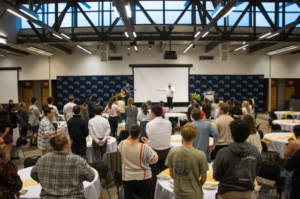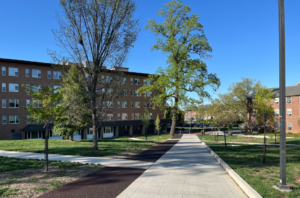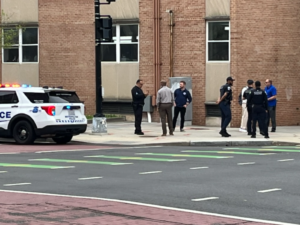The Irony of Modern Catholic History

By Renee Rasmussen
George Weigel, an American author, political analyst, and social activist, released his new book The Irony of Modern Catholic History: How the Church Rediscovered Itself and Challenged the Modern World to Reform on Catholic University’s campus this week.
Author of the New York Times bestseller, Witness to Hope: The Biography of Pope John II, Weigel’s new book focuses on the Catholic Church’s place in the modern world. It explores questions revolving around the current crisis of many people leaving the Church and takes a look at how the Church has progressed throughout history.
The book focuses on the Church’s response to modernity, a movement based on individualism and the scientific method. The book follows the Church’s movement from rejection and criticism of modernity to acceptance, and Weigel separates the book into five acts to reflect the movement. These five acts come together to build his thesis: once modernity was embraced in a Catholic way by the Church, non-believers who used modernity as an excuse for a lack of faith, were more easily converted.
While Weigel takes his readers through the vast history of the Catholic Church, his thesis funnels down to the importance of Vatican II on Catholicism. With Vatican II came a new evagination that attacked the religious indifference from which many former fervent religious communities were suffering. However, with Vatican II came confusion due to what Weigel calls a lack of “thread.”
While other ecunemical councils were created to deal with heresies or other major divides in the Church and resulted in new creeds, Vatican II took a different approach. Vatican II didn’t result in anything tangible for believers to hold onto. This is the “thread” Vatican II was missing in the beginning that caused confusion in the Church.
However, in 1985, the Church found the “thread” with the help of the papacy of Pope John Paul II. The “thread” that saved Vatican II, Wiegel argues, “is the concept of the Church as a communion of disciples in mission.”
This establishes, “that everyone can become a missionary and everywhere is mission territory,” Wiegel said. Wiegel stresses the importance of Catholics leading by example and that as Catholics we must “model something better.”
It is becoming more apparent in our modern world that the “nature of true discipleship is the measure of which the people in the church help others,” Wiegel said.
Wiegel argues that Catholics are entering a new age of Catholicsim.
“The Catholisicm of the 21sth century and 3rd millennium will be chosen not inherited by ethnicity or absorbed by some other religious omonis and it only because of the encounter of Jesus of Christ that has been embodied in the people of the Church,” Wiegel said.
Therefore we have a duty as Catholics to show a “more human way to live.” For if we model a warmer and more compassionate way of life people will begin to ask, “how can you live that way?” Wiegel says.
To end his talk Wiegel spoke about the tragedy that is the current abuse crisis in the Catholic Church. He states this crisis is a moment of “necessary purification” and a chance how the Church’s disciples to reevaluate and to make sure they are “seen to live what it [the Church] proclaims.” This purification, Wiegel stresses, involves everyone in the Church.








